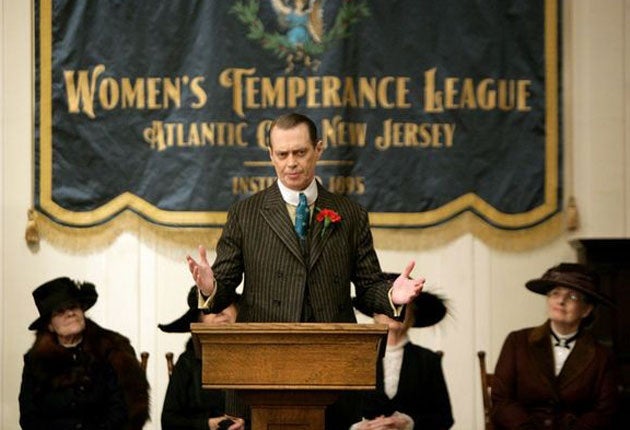Why the stars are making the big switch
Hollywood's big names are showcasing their talent on the small screen. Gerard Gilbert says TV is the place to take chances

There was much excitement in Cannes this year when it was announced that Dustin Hoffman was to direct a comedy Quartet for BBC Films, starring Maggie Smith, Albert Finney and Tom Courtenay about opera singers. But now this autumn, viewers in America will have the chance to see Hoffman in Michael Mann's Luck, which is also intriguingly being made for television, set in the worlds of horseracing and gambling.
Michael Mann created the decade-defining Eighties cop show, Miami Vice. But landing Hoffman for Luck is a major coup for HBO, as the Tootsie actor has not done TV since his breakthrough role in the 1967 film The Graduate.
Meanwhile, Oscar-winning Diane Keaton, is also about to step into her first regular TV role, in a new HBO comedy, Tilda, inspired by Hollywood blogger Nikki Finke, with its pilot episode helmed by Dreamgirls director Bill Condon.
"There was a time when television was the place where movie careers went to die," says Laura Fries of the Hollywood trade magazine Variety. "It was either a desperate cry for attention or for money."
It's not just the older movie talent that is trying on television for size. Charlize Theron, who won an Oscar in 2004 for Monster, is to take the lead role in a new TV crime drama, Mind Hunter, made by David Fincher.
Zooey Deschanel, meanwhile, is also foraying into television, with an adaptation of professional groupie Pamela Des Barres' memoir I'm with the Band, while Kate Winslet stars in Mildred Pierce, an upcoming HBO series.
"I don't think age necessarily has anything to do with it anymore," says Fries. "It's just that Hollywood has severely narrowed its list of bankable stars, so that really limits the opportunities. Television is the place to take chances without the same financial risks."
There is also a growing number of esteemed film directors experimenting with the less glamorous medium. The mostly hotly anticipated TV debut of 2010 is none other than Martin Scorsese who has directed the opening episode of HBO's Boardwalk Empire, an ambitious Prohibition-era gangster drama set in 1920s Atlantic City. "Many top-name directors are vying for a chance to direct episodes of hot new shows," says Fries.
The Hurt Locker's Oscar-winning director Kathryn Bigelow's next venture is also a television pilot. The Miraculous Year, is an examination of a New York family as seen through the lens of a charismatic, self-destructive Broadway composer. Written and produced by the Oscar-nominated writer of The Aviator and Gladiator, John Logan, this is a sure signal that TV doesn't have to have an inferiority complex any longer.
The best writers are increasingly attracted to television, especially the more permissive cable end of the medium. Graphic sex is breaking out all over cable with shows like Hung and Tell Me That You Love Me and Californication.
Indeed, The 40-Year-Old Virgin and Knocked Up scribe Seth Rogen's latest untitled project for Showtime is about three twentysomethings who learn about love and life while (wait for it) running a porno shop.
"Graphic sex is not a necessity of good storytelling," wrote Newsweek last year. "It's a carrot the cable networks use to attract creative talent, people who have visions and don't want them compromised."
Alan Ball, the Oscar-winning screenwriter of American Beauty, found himself diverted by television, first with his undertakers saga Six Feet Under, and then with his hit vampire show, True Blood. Working in a medium with such a swift turnaround from filming to screening is attractive. But the major reason that talent was migrating to TV, especially cable TV, was, because "it's really become a writer's medium – TV is the best place to be as a writer. I feel a lot more optimistic about TV than I do about movies."
Join our commenting forum
Join thought-provoking conversations, follow other Independent readers and see their replies
Comments
Bookmark popover
Removed from bookmarks